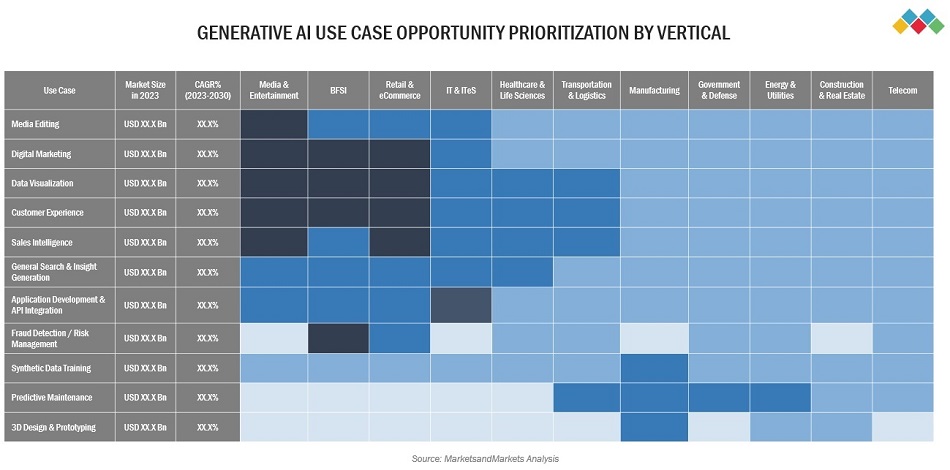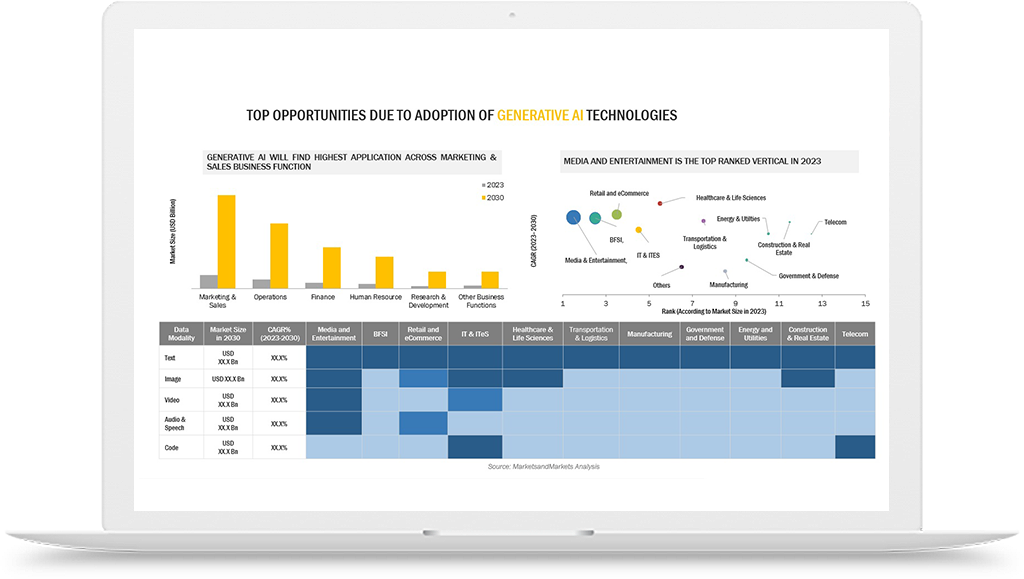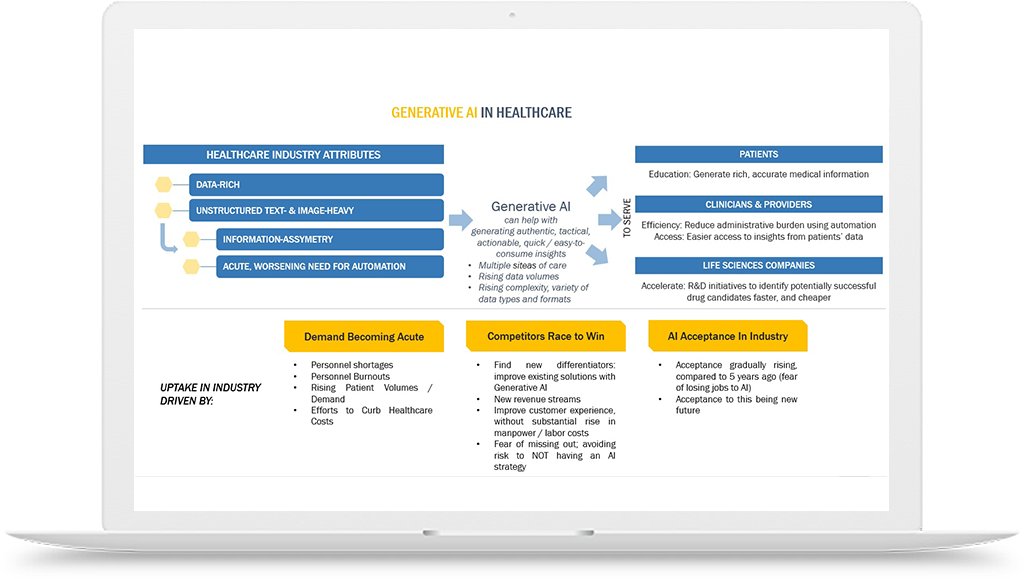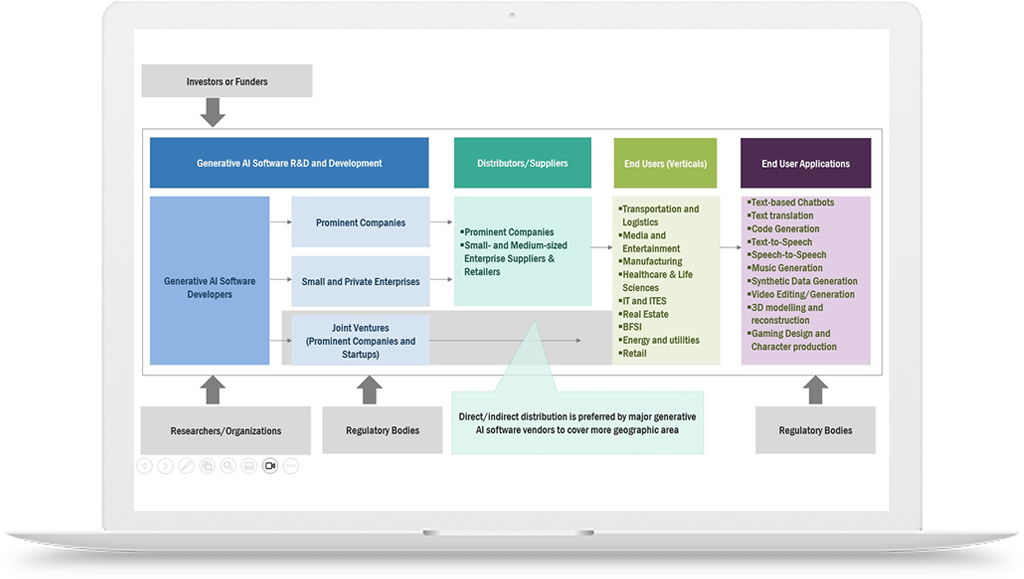Generative AI Use Cases
Top 10 High-Impact Use Cases in Generative AI Technology
Have you considered the diverse and innovative use cases that Generative AI can offer to your industry and operations?
Explore the top Generative AI Use Cases:
- How to target companies, and what are their top use cases?
- Who are the leading players in Generative AI?
- Which are their most demanding technology application areas?
- Which are the top growing applications/use cases of Generative AI?
- What is their revenue potential?
Top Ranked Verticals in Generative AI Economy


Read More..
Generative AI Use Cases
Generative AI has found applications across a wide range of industries and fields, demonstrating its versatility and potential to enhance various processes. Here are some notable generative AI use cases:
- Content Generation:
- Blog Posts and Articles: Write excellent articles on a range of subjects.
- Social Media Posts: Make interesting and pertinent content for social media.
- Product Descriptions: Create product descriptions for online sales automatically.
- Creative Writing:
- Poetry and Prose: Write original poetry, stories, and other types of writing.
- Script Writing: Write original poetry, stories, and other types of writing.
- Code Generation:
- Code Snippets: Generate code snippets based on high-level descriptions.
- Documentation : Generate code documentation automatically.
- Lagunage Translation :
- Real-time Translation: Convert text between different languages.
- Conversational Agents:
- Chatbots: Create chatbots to assist with customer service and information retrieval.
- Virtual Assistants: Create virtual assistants to handle administrative duties like reminders, scheduling, and information retrieval.
Generative AI use cases healthcare.
generative ai use cases healthcare has shown promising applications leveraging its ability to generate human-like text, images, and even simulate various scenarios.
- Medical Imaging Enhancement:
- Image reconstruction: By enhancing the quality and resolution of medical images, generative models can help with diagnosis accuracy.
- Image Synthesis: In situations where, real medical images are hard to come by, creating synthetic images can be helpful for training and augmenting datasets.
- Drug Discovery and Development:
- Molecular Generation: In order to help researchers find possible drug candidates, generative models can help generate novel molecular structures.
- Chemical Property Prediction: The process of developing new drugs can be streamlined by anticipating the characteristics of newly created compounds.
- Clinical Data Augmentation:
- Synthetic Patient Data: Without jeopardizing patient privacy, producing realistic patient data can help augment datasets for machine learning model training.
- Natural Language Processing (NLP) in healthcare:
- Clinical Documentation: Healthcare personnel can have their workload reduced by using generative models to help with the automatic generation of clinical notes, summaries, or reports.
- Chatbots for Patient Interaction: Chatbots that converse with patients, respond to their questions, and offer advice on prescription drugs or other therapies can be powered by NLP models.
- Disease Prediction and Early Diagnosis:
- Risk Prediction Models: Using patient data, generative AI can be used to build models that predict the likelihood of specific diseases, facilitating early diagnosis and treatment.
While these applications show great potential, it's important to note that ethical considerations, regulatory compliance, and the need for validation in real-world healthcare settings are crucial aspects that must be carefully addressed when implementing generative ai use cases healthcare.
Generative AI trends
Generative AI is advancing rapidly, with models exhibiting impressive abilities in text, image, audio, and video generation. Key trends include democratization of access, multimodal capabilities, specialization for niche tasks, commercial adoption across sectors, and growing discussion around ethics and governance. Overall, generative models are transitioning from research into broader viability, but responsible innovation remains critical.
Here Some Generative AI trends
- Improved Realism and Creativity:
- Prediction: Generative AI models will continue to improve their ability to produce content that is identical to the works of human creativity. This includes written content, musical compositions, and extremely realistic images.
- Multimodal AI:
- Prediction: Multiple data types will be handled expertly by future generative AI models. They will, for instance, produce content that fluidly blends text, graphics, and audio to improve multimedia experiences and creative possibilities.
- Enhanced Personalization:
- Prediction: More and more content and experiences will be personalized thanks to generative AI, from specially crafted goods and services to news articles and commercials.
- Ethical AI Development:
- Prediction: In generative AI, ethical issues will only become more significant. The main goals of developers will be to lessen prejudices, maintain transparency, and create rules for the appropriate application of AI.
- Few-shot and Zero-shot Learning:
- Prediction: Even less training data will be needed for generative AI models to function well. This will facilitate faster deployment in new applications and increase their adaptability to specialized domains.
- Continual Learning and Adaptation:
- Prediction: Systems using generative AI will become more flexible as they learn and adapt over time to meet the needs and preferences of changing users.
Generative AI use cases business.
generative AI use cases business has a wide range of applications in various business domains Here are some notable use cases:
- Content Generation:
- Marketing Content: AI can produce advertising content, product descriptions, and marketing copy, assisting companies in producing interesting and convincing marketing collateral.
- Blog Posts and Articles: Content creators can save time and resources by using content generation tools to generate blog posts and articles on particular subjects.
- Design and Creativity:
- Graphic Design: AI can expedite the creative process by helping to create logos, graphics, and other design elements.
- Product Design: In sectors like manufacturing, generative design can be applied to optimize and generate new product designs within predetermined parameters.
- Chatbots and Virtual Assistants:
- Customer Support: Routine customer inquiries can be handled by AI-driven chatbots, which can respond instantly and free up human agents to handle more complicated problems.
- Virtual Assistants: Companies can create virtual assistants with generative AI that can plan appointments, automate tasks, and deliver information.
- Language Translation:
- Multilingual Communication: Real-time language translation using generative AI can help people who speak different languages communicate with each other.
- Data Analysis and Reporting:
- Automated Reporting: By evaluating data and condensing important findings, generative AI can automate the production of reports, saving analysts and decision-makers time.
- Data Synthesis: Artificial intelligence (AI) models can produce fake data for training and testing, allaying privacy concerns in data-driven applications.
Generative AI use cases business Continues to evolve, and businesses across industries are exploring innovative ways to leverage its capabilities to improve efficiency, productivity, and creativity.
Generative AI challenges
Because of the complexity involved in developing systems that can produce content similar to that of humans across a range of domains, generative AI faces a number of difficulties.
Some of the Generative AI challenges include:
- Quality Control:
Challenge: Because errors and inconsistencies can happen, it can be challenging to ensure the quality and accuracy of content generated by
- Biases and Fairness:
Challenge: Biases in training data can be inherited by generative AI models, producing unfair and discriminatory results. This could hurt marginalized groups and reinforce stereotypes.
- Misinformation and Fake Content:
Challenge: Deepfakes, fake news, and fraudulent content can be produced by misusing generative AI, which can cause misinformation and trust issues.
- Ethical Use:
Challenge: Privacy and misuse are major concerns when it comes to the ethical application of generative AI, particularly in fields like law enforcement, cybersecurity, and surveillance.
- Security and Attacks:
Challenge: Security measures are made more difficult by the potential for generative AI to be used to create malicious content, such as malware, phishing emails, and fraudulent documents.
Addressing these generative AI challenges requires a multidisciplinary approach involving advancements in machine learning, natural language processing, ethics, and human-computer interaction. Researchers and practitioners continue to work towards overcoming these obstacles to advance the field of generative AI.
Generative AI use cases marketing
There are many uses for generative AI in marketing, where it can help companies increase productivity, foster innovation, and improve client relationships.
Real-world Examples of Generative AI use cases marketing
Several real-world examples illustrate the successful implementation of generative AI use cases marketing. These examples demonstrate how businesses leverage these technologies to enhance creativity, streamline processes, and improve customer engagement:
- ChatGPT for Conversational Marketing:
- ChatGPT from OpenAI is used to power conversational marketing chatbots. These chatbots are used by businesses on their websites to interact with users, respond to their questions, and help them move through the sales funnel. This improves the user experience and offers immediate support.
- Phrasee for Email Marketing:
- An AI-powered tool made especially for email marketing is called Phrasee. It generates email copy and subject lines that are likely to be resonant with recipients by utilizing generative algorithms and natural language processing (NLP). This enhances campaign efficacy overall and email open rates.
- Albert for Digital Advertising:
- Albert is an AI platform made for advertising and digital marketing. It streamlines the development, implementation, and assessment of digital marketing campaigns via channels such as search, display, and social media. Based on performance data, Albert employs generative algorithms to optimize and adjust campaigns in real-time.
- Adobe Sensei for Content Creation:
- Adobe Sensei is a platform for AI and machine learning that is used in marketing to create and customize content. It can expedite the creative process by automatically generating and suggesting layouts, designs, and images based on user preferences and trends.
- IBM Watson for Social Media Analysis:
- Marketing uses IBM Watson's AI capabilities for social media analysis. It can analyze sentiment on social media, spot trends, and provide information about how customers behave there. Marketers can adjust their strategies based on this information to better reflect public opinion.
These illustrations show the wide range of uses for generative AI use cases marketing, from the development and personalization of content to the improvement of pricing and advertising campaigns. We can anticipate seeing even more creative use cases in the marketing space as technology develops further.
Generative AI use cases banking.
Numerous uses for generative AI exist in the banking industry, where it can help with decision-making, customer experiences, and operational efficiency.
Advantages of generative AI use cases banking:
When used for banking use cases, generative AI has various benefits.
- Enhanced Fraud Detection: Massive transaction data can be analyzed by generative AI, which can also spot patterns that point to fraud. These models are very good at real-time fraud detection and prevention because they can adjust and learn from new data.
- Improved Customer Service: Chatbots and virtual assistants driven by generative AI can offer 24/7 customer support, quickly handling common questions and tasks. Customers are happier as a result, and customer support agents can concentrate on more complicated problems.
- Algorithmic Trading Optimization: Real-time trading algorithm optimization and trend analysis are both possible with generative AI. This results in more knowledgeable and flexible trading tactics, which could enhance the financial performance of companies using algorithmic trading.
- Cost Reduction and Efficiency: Generic artificial intelligence (AI) can help banks save operating expenses and boost overall productivity by automating repetitive tasks and procedures. Employee concentration can now be directed toward more strategic and valuable tasks.
- Customer Sentiment Analysis: Customer sentiments expressed across a variety of channels can be analyzed by generative AI, which offers insightful information about customer preferences and satisfaction. Financial institutions can use this data to enhance their offerings in terms of goods, services, and client relations tactics.
Although these benefits seem encouraging, responsible and secure application of generative AI use cases banking industry requires addressing issues like data privacy, ethical concerns, and regulatory compliance.
Generative AI use cases finance
Generative AI use cases finance several industries, leveraging its ability to analyze data patterns, generate content, and make predictions.
Here are some Generative AI use cases finance applications.
- Fraud Detection:
- To find patterns and anomalies connected to financial transaction fraud, generative models can be utilized.
- These models are able to recognize odd patterns or behaviors that might point to fraudulent transactions by learning from historical data.
- Portfolio Management:
- To optimize investment portfolios, generative models can simulate different market scenarios and analyze historical market data.
- Based on a person's risk tolerance, financial objectives, and market conditions, they can help create tailored investment recommendations.
- Sentiment Analysis:
- Sentiment analysis on news articles, social media, and other textual data can be done with generative AI to determine the mood of the market.
- Making wise investment decisions can benefit from having a thorough understanding of market sentiment.
- Forecasting Economic Trends:
- In order to forecast economic trends and assist organizations in making better financial decisions, generative models can evaluate historical data and macroeconomic indicators.
- Regulatory Compliance:
- Through the analysis of massive amounts of data for potential regulatory issues, generative AI can help with monitoring and ensuring compliance with financial regulations.
These use cases highlight the variety of ways that generative AI is being applied in the finance industry, helping to enhance customer experiences, decision-making, and prediction accuracy.
Generative AI use cases financial services.
The financial services sector can benefit from generative AI in a number of ways, as it can help businesses improve customer experiences, make better decisions, and streamline operations.
Future of generative AI use cases financial services
It is probable that generative AI in finance will continue to progress and find new uses in the future. Here are some potential future use cases.
- Explainable AI in Risk Assessment:
Explainability will become more and more important in risk assessment models as generative AI models get more complex. In order to comply with regulations and win over stakeholders, future developments may concentrate on improving the transparency and understandability of these models.
- AI-Driven Regulatory Compliance:
Given how regulations are constantly changing, generative AI has the potential to be extremely important in automating compliance procedures. In order to help financial institutions stay informed about regulatory changes and stay out of trouble, future systems may be able to generate and update compliance models in real-time.
- AI-Enhanced Customer Experience:
It's likely that generative AI will be used more and more in customer service and engagement. More sophisticated virtual assistants with the ability to comprehend context, emotions, and natural language may be used in future applications to provide more individualized and human-like interactions with clients.
- Decentralized Finance (DeFi) Optimization:
Generative AI may be used to improve different DeFi platform features as decentralized finance expands. This covers the creation of smart contracts, evaluating lending protocol risk, and algorithmic trading in decentralized ecosystems.
- Blockchain and Smart Contracts:
Applications for generative AI could include improving the security and effectiveness of blockchain-based systems. This involves creating smart contracts that can respond to shifting circumstances within the blockchain ecosystem, be more self-executing, and secure.
Generative AI use cases insurance.
The insurance industry could undergo a revolution in a number of areas thanks to generative AI, which can automate procedures, improve customer satisfaction, and facilitate better decision-making.
Here are some Benefits of generative AI use cases insurance:
generative AI use cases insurance can offer various benefits across different aspects of the industry. Here are some key advantages.
- Enhanced Underwriting Accuracy: Large-scale datasets, such as past claims data and external variables, can be analyzed by generative AI to produce risk assessments that are more precise. This helps insurers set appropriate premiums based on individual risk profiles and results in better underwriting decisions.
- Improved Fraud Detection: Artificial intelligence (AI) that uses pattern recognition and anomaly detection to analyze data can help detect fraudulent activity early on. This helps preserve the integrity of the insurance system in addition to lowering insurers' financial losses.
- Streamlined Claims Processing: The workflow for processing claims can be considerably accelerated by automation using generative AI. More efficiency in handling tasks like damage assessment and cost estimation can result in faster settlement of claims and higher levels of customer satisfaction.
- Personalized Policies and Pricing: Using individual customer data analysis, generative AI can customize insurance plans and costs according to particular risk factors. In addition to exceeding customer expectations, this degree of personalization aids insurers in portfolio management.
- Cybersecurity Insurance Advancements: Generative AI can help insurers evaluate and comprehend cyber risks in the context of cybersecurity insurance. As a result, underwriting and pricing become more accurate, assisting insurers in navigating the constantly changing world of cybersecurity threats.
Applying generative AI to insurance procedures can boost precision, effectiveness, and client happiness, which will ultimately help the insurance sector as a whole.
Generative AI use cases life sciences
Generative AI has demonstrated great promise in a range of life sciences applications by utilizing its capacity to extract and produce intricate patterns from massive datasets.
Here are some Generative AI use cases life sciences:
- Drug Discovery and Design:
- Molecule Generation: In order to create new molecules with the right properties for drug development, generative models can help.
- Virtual Screening: Drug discovery can be sped up and cost-effectively by using AI models to analyze large chemical databases and predict possible drug candidates.
- Protein Structure Prediction:
- Protein Folding: Understanding protein interactions and functions is aided by the use of generative models, which can forecast the three-dimensional structures of proteins.
- Drug-Target Interaction Prediction: AI models can forecast the interactions between drugs and particular protein targets, which helps in the development of more potent drugs.
- Biological Image Analysis:
- Cellular Image Generation: The use of generative models can help train image analysis algorithms and lessen the requirement for large amounts of real-world data by producing realistic synthetic images of cells, tissues, or biological structures.
- Personalized Medicine:
- Patient-Specific Treatment Plans: AI algorithms are capable of analyzing genetic and other patient data to create individualized treatment regimens that take into account each patient's unique characteristics and responses.
- Vaccine Design:
- Antigen Prediction: In order to create vaccines against infectious diseases, generative models can help predict possible antigenic targets for vaccine development.
These applications of generative AI use cases life sciences in advancing research, drug discovery, and healthcare in the life sciences field.
Generative AI use cases enterprise
Generative AI use cases enterprise a wide range of in the sector, transforming various aspects of business operations.
Here Some Application of Generative AI use cases enterprise:
- Supply Chain Optimization:
- Demand Forecasting: Utilize past data to forecast product demand, which will improve inventory control.
- Route Optimization: Provide the best possible routes for supply chain logistics.
- Predictive Maintenance:
- Equipment Health Monitoring: To determine when machinery or equipment will likely need maintenance or replacement, use generative models.
- Cybersecurity:
- Anomaly Detection: Recognize odd trends in user behavior or network traffic to help identify possible cybersecurity threats.
- Energy Management:
- Smart Grids: Use generative algorithms to optimize the distribution and use of energy in smart grids.
- Quality Control:
- Manufacturing Defect Detection: Use generative models to find manufacturing process flaws and improve quality control.
Businesses will probably discover ever more creative and customized uses for generative AI technologies as they develop, enhancing their operations and decision-making in a variety of sectors.
Generative AI use cases manufacturing
The manufacturing sector can benefit from generative AI in a number of ways, including process optimization, improved product design, and increased overall efficiency.
Here are several Generative AI use cases manufacturing:
- Product Design Optimization:
By examining a wide range of design options in accordance with predetermined goals and constraints, generative design algorithms can help engineers create designs that are optimized. This aids in the creation of components that are strong, lightweight, and effective.
- Supply Chain Optimization:
Generative AI is capable of analyzing intricate data from supply chains to streamline inventory and logistics. It can forecast demand, shorten lead times, and boost the effectiveness of the supply chain as a whole.
- Quality Control:
Systems for image recognition driven by AI can be used for quality assurance. Large datasets of flawless products can be used to train generative models, which can then be used to spot anomalies or faults in real time on the manufacturing line.
- Process Optimization:
Manufacturing process optimization can be achieved through the analysis of variables like temperature, pressure, and speed by generative AI algorithms. Energy savings, a decrease in waste, and an increase in general efficiency can result from this.
- Robotics and Automation:
Within a manufacturing facility, robotic movements and automation processes can be optimized with the help of generative AI. This may result in more accuracy, quicker output, and safer working conditions.
Generative AI use cases manufacturing the potential to revolutionize various aspects of, contributing to increased efficiency, cost savings, and innovation in the industry.
Generative AI use cases fintech
In the fintech (financial technology) sector, generative AI can be used for a variety of use cases to improve productivity, judgment, and customer experience.
Application of generative AI use cases fintech:
Generative AI use cases fintech numerous providing innovative solutions to address challenges and enhance various aspects of financial services.
Here are specific applications for generative AI in fintech:
- Credit Scoring and Risk Assessment:
To increase the accuracy of credit scoring, apply generative models to analyze a variety of data sources, including unconventional ones like social media activity. This can facilitate a more thorough evaluation of a person's creditworthiness by financial institutions.
- Fraud Detection and Prevention:
Apply generative AI algorithms to find patterns and anomalies that point to possible fraud. By evaluating transaction data, user behavior, and real-time detection of suspicious activity, this can improve fraud prevention systems.
- Algorithmic Trading Strategies:
Utilizing generative AI, create sophisticated trading algorithms to examine past performance, current market conditions, and other pertinent variables. These algorithms can optimize portfolio performance by making faster and more informed trading decisions.
- Personalized Financial Planning:
Utilize generative models to examine user preferences and financial data in order to provide tailored financial guidance. This can include financial product recommendations that are in line with personal objectives, budgeting advice, and investment strategies.
- Automated Financial Reporting:
Use generative AI to automate the creation of financial reports, guaranteeing accuracy and adherence to accounting guidelines. Financial institutions may be able to save time and costs by doing this.
These applications show how generative AI can help the fintech sector improve the efficiency, security, and personalization of financial processes. Regulation compliance, data privacy, and ethical considerations should all be taken into account when implementing these applications.
Generative AI use cases telecom
Generative AI use cases telecom industry has several potentials.
Here are some examples of Generative AI use cases telecom:
- Network Optimization:
- Problem Identification: Large amounts of network data can be analyzed by generative AI to find possible problems or inefficiencies in the telecom network.
- Predictive Maintenance: It can anticipate network congestion or equipment breakdowns, enabling proactive maintenance to reduce downtime.
- Fraud Detection:
- Anomaly Detection: Generative models have the ability to identify anomalies, such as SIM card cloning or strange call patterns, and learn patterns of typical network behavior.
- Customer Support:
- Chatbots: Chatbots with generative AI capabilities can respond to consumer questions, solve typical problems, and offer immediate support, increasing the effectiveness of customer care.
- Network Planning:
- Traffic Prediction: In order to forecast future network traffic patterns, generative models can evaluate past data. This capability aids telecom companies in planning network expansions or optimizing their current infrastructure.
- Security:
- Threat Detection: Through network traffic analysis, generative AI can detect and react to security threats by spotting anomalous patterns or possible cyberattacks.
These use cases demonstrate the wide range of ways that generative AI is being applied in the telecom sector, from boosting network security and efficiency to enhancing customer experience and customizing services. It's conceivable that creative and novel use cases will keep appearing as technology develops.















